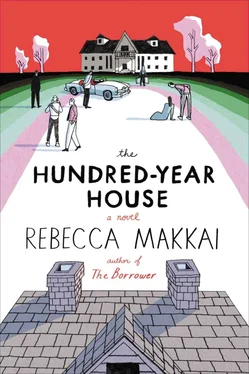“So you gotta get it out of there.”
“Sure. I know. It’s keeping me awake.”
“You tell Zee?”
Doug shook his head. With each day he knew he was less likely to. He wasn’t sure if she would laugh and tell him he needed real source material, not old phone bills, or if she’d storm the attic herself and take over the whole enterprise, but something in his bones rebelled against what should have been spousal transparency. Maybe the secret of the Friends books had indeed been a tiny wedge.
“So you’re going to help me.”
“I’m — okay, what, we’re breaking in? I wear a ski mask?”
“You pretend to be a photographer.”
Leland laughed and shook his head. “No, no, this is sounding like a sitcom.”
“Listen: Any Moore documents, any correspondence, you can have it. You can publish it, sell it, it’s yours.”
“Huh. Christ.”
“I just want the Parfitt stuff.”
What he asked Leland to do was call Gracie pretending to be with the Adler Ross Foundation. Adler Ross was the architect of the place, just famous enough for someone to care about his attics. Leland was going to be sad and sweet and claim this was the last attic he needed to photograph to complete the records. He’d take pictures of the windows, throw around some jargon, get out of there. “It’s reconnaissance,” Doug said. “You just see if there are file cabinets. And if everything’s going well, maybe ask if you can move one to get a better picture, then you say, ‘God, these are heavy, what’s in these things,’ right? And meanwhile you’re watching what key she uses on the attic door, where she puts it when she’s done.”
“This is insane, Doug. I’m not a good liar.”
“Marianne Moore. Marianne Moore’s undiscovered poem about her secret affair with Mickey Mantle.”
“Well, yeah. Okay. True.”
Zee had waited patiently through the whole summer session, through one sweltering reception on the president’s lawn, and the first two weeks of class. She finally let herself go to the science building computer lab to type up the letter. She sat with her back to the windows and typed in eight-point font, then blew it up only for proofreading.
Dear Dean Shaumber and Prof. Blum,
I write on behalf of myself and two other female students who feel disturbed by the photos on Dr. Cole’s computer. We are sure you are familiar with the photos, as they are common knowledge. Although he closes that file when we enter the office, it is unnerving to know he has been looking at the photos, and that he is in a state of mind to degrade women.
We simply wish him to consider the effect this behavior has on those women who visit his office. We are also upset about his continual use of the word “coed,” but this is old news and we understand nothing is going to be done about it, and furthermore we and the other students we have spoken to are far more disturbed about the pornography.
Respectfully submitted by three women who wish to remain anonymous.
Zee went back and forth on the spelling of effect , but figured the three imaginary girls would be imaginary English majors, and would get it right. She left two copies in the printer trays where they could be found by students, then stuck one copy in Shaumber’s mailbox and one in Blum’s.
This last she did right in front of Chantal, but there were plenty of other papers in there already. She turned calmly and asked Chantal to make some copies. Her mother had always maintained, back in the days when Zee and her father had played hide-and-seek around the house, her father as gleeful as any eight-year-old, that plain sight was the best place to hide. They’d talk Gracie into hiding, and when they found her she’d been sitting in the kitchen right where they’d left her, smoking a Virginia Slim. “But it took you five minutes!” she’d say when they complained. That was in the days before her mother put on airs, back when the estate was just a ramshackle shell for a regular, sloppy family, entire guest rooms given over to Zee’s Lego configurations. Friends from the art world — George’s reviews eventually went beyond the local scene, and the house became a pit stop for artists passing through Chicago — would play Mastermind with Zee at the table while Gracie cooked eggs. The only formality was her father’s predilection for folding the dinner napkins into sailboats on special occasions. Things hardened after his death. It was later that year — Zee was still twelve — when her mother saw her take a spoonful of chocolate frosting from the container and said, “That’s how girls get fat.” Her mother had gotten a manicure, had wallpapered the bathrooms, had joined the Presbyterian church, all new things Zee didn’t understand except to know that everything was different now, that without her father’s laugh dismissing the rest of the world, there were appearances to be maintained.
—
On her way out of the building she ran into Cole, who held the door open. Those eyebrows: long white hairs among the dark short ones. Someone had planted them in the wrong garden. “Smile!” he shouted, and because her every interaction with the man was a charade anyway, she did just that. He didn’t let her past, though. He poked a bony finger into her sternum, right above her blouse. “Do you know why I like it when you smile?”
“I do not,” she said, still grinning, though her ears were hot now, and her neck.
“You resemble someone I used to know. It’s uncanny. The ears and chin.”
“Why, thank you,” Zee said, and leaned back so she could get around his finger without it grazing her breast.
“A man, mind you!” he called after her. “It was a man!”
Doug had been much more confident about the soccer chapters in the previous book — he’d played varsity in high school, three lifetimes ago — than about the theater business here. He was flummoxed by the parts of Frieda’s outline where the Populars and the Friends shared a dressing room. In the back of an old notebook, he’d begun listing things he needed to research:
Would have bra?
Purse? Backpack?
Stage makeup?
Undress in front of each other or hide in stalls?
Chairs backstage? Benches?
They read like a pedophilic stalker’s notes, and he wanted them scratched out as soon as possible. He could maybe use the Internet for the theater parts, but he shuddered to think where an AltaVista search for “twelve-year-old, brassiere” would lead.
He started down to look for Miriam, but she was on the landing of the stairs, cross-legged, sorting through an ice cube tray of colored beads. She said “Oh!” and some of the glassy blue ones splashed out and rolled down the steps. Doug bounded down, picked them up with the sweat of his fingertips, then shook them into Miriam’s outstretched palm.
“I’ll tell you why I’m here,” she said, as Doug sat on the step above her. He regretted his choice of seat immediately. She wasn’t wearing a bra, and he could see too far down her green tank top. He leaned back and looked instead at the ceiling. Miriam said, “I wasn’t sleeping well, so I thought I’d spend time in the ghostliest part of the coach house. Just to dare something to happen. If it does, I’ll know. And if it doesn’t, I’ll sleep better.”
“Why is this the ghostliest part?” He hoped she didn’t have a good answer.
“Oh, you know. Doorways, staircases, attics, windows. You never see a ghost in the middle of the room.”
“I’ve never seen a ghost at all.”
“Well, yes. That.”
“But Doug,” she said. “I found out. How she died.”
“What, Violet?” He sat back up despite himself.
Читать дальше












